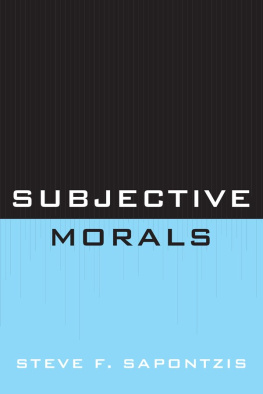

First published in Great Britain in 2019 by
Bristol University Press 1-9 Old Park Hill Bristol BS2 8BB UK Tel +44 (0)117 954 5940 www.bristoluniversitypress.co.uk
North American office: Policy Press c/o The University of Chicago Press 1427 East 60th Street Chicago, IL 60637, USA t: +1 773 702 7700 f: +1 773-702-9756 e:
Bristol University Press 2019
British Library Cataloguing in Publication Data
A catalogue record for this book is available from the British Library
Library of Congress Cataloging-in-Publication Data
A catalog record for this book has been requested
ISBN 978-1-5292-0375-2 hardcover
ISBN 978-1-5292-0387-5 ePub
ISBN 978-1-5292-0390-5 Mobi
ISBN 978-1-5292-0379-0 ePdf
The right of Hans Boutellier to be identified as author of this work has been asserted by him in accordance with the Copyright, Designs and Patents Act 1988.
All rights reserved: no part of this publication may be reproduced, stored in a retrieval system, or transmitted in any form or by any means, electronic, mechanical, photocopying, recording, or otherwise without the prior permission of Bristol University Press.
The statements and opinions contained within this publication are solely those of the author and not of the University of Bristol or Bristol University Press. The University of Bristol and Bristol University Press disclaim responsibility for any injury to persons or property resulting from any material published in this publication.
Bristol University Press works to counter discrimination on grounds of gender, race, disability, age and sexuality.
Cover design by Bristol University Press
Front cover image: istock
Readers Guide
This book has been optimised for PDA.
Tables may have been presented to accommodate this devices limitations.
Image presentation is limited by this devices limitations.
Contents
Hans Boutellier is a professor in the Department of Political Science and Public Administration in the Faculty of Social Sciences at Vrije Universiteit (VU Amsterdam) in the Netherlands. His field of study is security and resilience.
He is also scientific director of the Verwey-Jonker Institute in Utrecht in the Netherlands. This is an independent social research institute, which works for national and local government and other research funders in the public sector.
Boutellier is a specialist in themes such as social order, governance, security and safety, diversity and public morality. He has published hundreds of articles on these subjects, both scientifically and professionally. He has previously written four monographs.
According to Dutch weekly Vrij Nederland (Free Netherlands), Boutellier is a keen thinker on the paradoxes of our time.
A famous painter of Chinese characters once said, after making some over a weekend, that it took all his life to finish them. Something like that could be said of this book. It took me a year to write it, but I needed some decades to develop the ideas and the competence to write them down.
I have done a lot of theoretical studies and research projects during my career, and in this book I use all the insights I have gained during these years. My studies have resulted in hundreds of articles and reports (mostly in Dutch). I have previously brought them together in the form of four monographs, which in my view is still the most relevant and intellectually satisfying art of publication. This book is the English culmination of these publications, in which I bring my ideas a little further with the concept of emerging morality.
Given this background, I have to thank a lot of people who inspired me during my career or who actually helped me in finishing this very publication. Lets start with my wife Els, and my children Bas and Nikki, who have started their own careers now. My studies have been an infringement of our family life. I hope they will forgive me for being absent so often, physically and mentally, when I was practising my Chinese characters.
I would also like to thank my colleagues at the Verwey-Jonker Institute in Utrecht, who have informed and inspired me with all the (action) research projects we have accomplished on various domains like security, safety, (health) care, social work, youth care and diversity; especially my colleague board member Majone Steketee, who has given me a lot of support in developing my intellectual ambitions.
Next to that, I would like to thank my colleagues at the VU Amsterdam (Free University). My part-time professorship since 2004 at the Department of Political Science and Public Administration in the Faculty of Social Sciences has been extremely important for understanding concepts like governance, processes, networks and complexity. I am grateful to the Dean of the faculty, Professor Karen van Oudenhoven, and the former Head of the department, Professor Willem Trommel, for the confidence they have shown and the value they have attached to my work. Last but not least, I would like to mention Associate Professor Dr Ronald van Steden, with whom I have accomplished a lot of projects, articles, classes and debates on security, resilience, morality, values and citizenship.
I should mention many more people than I will do here, but they are too many and I am afraid I will forget some. One person I will not forget is Professor Andrew Millie, who has invited me to write this volume in his New Horizons in Criminology series. He has given me a lot of instruction, advice and support. Without him, this book would have wanted to be written, but it would not have succeeded.
NEW HORIZONS IN CRIMINOLOGY
Series editor: Professor Andrew Millie, Department of Law and Criminology, Edge Hill University, UK
I have admired Hans Boutelliers work on crime and morality for a number of years and was keen to ask him to contribute to the New Horizons in Criminology book series. Much of his work is published in Dutch and, whilst some has been translated into English, I believe it deserves a far wider audience. In 2014 I was invited to speak at the International Conference on Law Enforcement and Public Health, hosted by VU University in Amsterdam. By chance, at a conference dinner I was sat next to Hans and was able to discuss the idea of a new book. I am delighted that our informal discussion that night has now resulted in what I believe will be seen an important little book.
A Criminology of Moral Order is the sixth title in the New Horizons in Criminology book series. The series is home for concise authoritative texts that are international in scope and reflect cutting-edge thought and theoretical developments in criminology. The books are written by leading authors in their fields and I was very pleased when Hans agreed to contribute. This book is the culmination of work that previously resulted in four books three of which have been translated into English - Crime and Morality (2000), The Safety Utopia (2005) and The Improvising Society (2013); and one that, at the time of writing, is still only available in Dutch - The Secular Experiment (2015). For the current text, Boutellier developed the ideas put forward in these earlier publications resulting in a unique and insightful contribution to criminological understanding of both morality and order.
Moral judgments are central to processes that result in actions or omissions being declared as harmful to others, or being labelled as crimes. And crimes and harms (and the labelling of harms and crimes) can have deleterious effects on the moral order of society however defined. Yet, according to Boutellier, criminologists have often neglected issues of morality. In this book Boutellier skilfully explains how moral order is conceived within complex networked societies. He makes the point that in a secularized and networked society a common moral ground is difficult to find. He argues that in a Western context at least where societies were once ordered around religion or class, today there is a much looser, fragmented and individualized social order which he characterizes as complexity without direction. According to Boutellier, this results in moral spaces dominated by concerns for security and processes of securitization.








